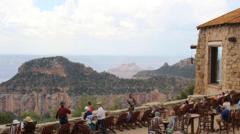Despite a tragic attack in April that terrorized tourists, optimism is blooming as families resume travel plans to Kashmir, igniting hope for local businesses.
**Reviving Hope: Kashmir’s Tourism Gears Up After April Tragedy**

**Reviving Hope: Kashmir’s Tourism Gears Up After April Tragedy**
Two months post-attack, the Kashmir tourism sector shows initial signs of recovery as families return to the valley.
In the heart of the Himalayan mountains, Indian-administered Kashmir is cautiously rebounding from a tragedy that shook its tourism sector. Just two months after a deadly attack on tourists near Pahalgam, which led to the deaths of 26 individuals and heightened tensions between India and Pakistan, the valley is seeing a gradual influx of visitors once more.
Families like the Awwals, who traveled from Rajasthan, have resolved to embrace the beauty of Kashmir despite the past incidents. "Summer in Rajasthan is unbearable, and Kashmir is a favorite getaway for our family during school vacations," Shabana Awwal stated while her children enjoyed a water bike ride on the iconic Dal Lake. Initially concerned by reports of the April attack, the family decided to go ahead with their plans, dismissing fears as media exaggeration.
Tourism, a pivotal component of Jammu and Kashmir's economy, experienced a dramatic downturn after the attack, with nearly 48 tourist spots shuttered. Chief Minister Omar Abdullah noted that the fallout was immediate, resulting in mass cancellations and a worrying outlook for the tourism season. He remarked, "The impact has been felt widely, and our tourism season this year is destined for difficulties."
Historically, Kashmir has been a focal point of conflict, yet even during its turbulent years, tourists were seldom a target. This continuous strife has made the recent violence all the more shocking. The optimism now felt by visitors showcases a resilience against fear. Another family, the Gandhis from Jammu, reiterated their yearly tradition of visiting the valley, asserting that nothing could deter them from enjoying Kashmir’s splendor.
The recent arrival of international tourists, including a group from Poland, signifies renewed faith in Kashmir's safety and allure. "Tourism is our life, and we're hopeful for its revival after such unfortunate incidents," said Haji Wali Mohammad Bhat, president of the shikara owners' association, expressing the sentiment of many who depend on the influx of tourists for their livelihoods.
Ravi Gosain, president of the Indian Association of Tour Operators, emphasized the historical resurgence of tourism in the region before the attack and expressed belief that recovery is possible. Efforts to foster tourism are being bolstered by improved transportation links, including a new train service connecting Srinagar to India’s railway system.
This development promises to facilitate travel to the valley, drawing more tourists who are eager to experience its charm, such as Ghanshyam Bharadwaj, who recently ventured to Srinagar with his family after a spontaneous decision. "There’s nothing to be scared of. This is our country," he affirmed amidst the serene backdrop of Dal Lake.
Moving forward, Chief Minister Abdullah hopes for a gradual increase in the duration of stays among tourists, moving from hours to days, thereby bolstering the local economy. The path to recovery is long but marked by small signs of hope as Kashmir begins to heal and welcomes back those eager to explore its breathtaking landscapes.
Families like the Awwals, who traveled from Rajasthan, have resolved to embrace the beauty of Kashmir despite the past incidents. "Summer in Rajasthan is unbearable, and Kashmir is a favorite getaway for our family during school vacations," Shabana Awwal stated while her children enjoyed a water bike ride on the iconic Dal Lake. Initially concerned by reports of the April attack, the family decided to go ahead with their plans, dismissing fears as media exaggeration.
Tourism, a pivotal component of Jammu and Kashmir's economy, experienced a dramatic downturn after the attack, with nearly 48 tourist spots shuttered. Chief Minister Omar Abdullah noted that the fallout was immediate, resulting in mass cancellations and a worrying outlook for the tourism season. He remarked, "The impact has been felt widely, and our tourism season this year is destined for difficulties."
Historically, Kashmir has been a focal point of conflict, yet even during its turbulent years, tourists were seldom a target. This continuous strife has made the recent violence all the more shocking. The optimism now felt by visitors showcases a resilience against fear. Another family, the Gandhis from Jammu, reiterated their yearly tradition of visiting the valley, asserting that nothing could deter them from enjoying Kashmir’s splendor.
The recent arrival of international tourists, including a group from Poland, signifies renewed faith in Kashmir's safety and allure. "Tourism is our life, and we're hopeful for its revival after such unfortunate incidents," said Haji Wali Mohammad Bhat, president of the shikara owners' association, expressing the sentiment of many who depend on the influx of tourists for their livelihoods.
Ravi Gosain, president of the Indian Association of Tour Operators, emphasized the historical resurgence of tourism in the region before the attack and expressed belief that recovery is possible. Efforts to foster tourism are being bolstered by improved transportation links, including a new train service connecting Srinagar to India’s railway system.
This development promises to facilitate travel to the valley, drawing more tourists who are eager to experience its charm, such as Ghanshyam Bharadwaj, who recently ventured to Srinagar with his family after a spontaneous decision. "There’s nothing to be scared of. This is our country," he affirmed amidst the serene backdrop of Dal Lake.
Moving forward, Chief Minister Abdullah hopes for a gradual increase in the duration of stays among tourists, moving from hours to days, thereby bolstering the local economy. The path to recovery is long but marked by small signs of hope as Kashmir begins to heal and welcomes back those eager to explore its breathtaking landscapes.

















